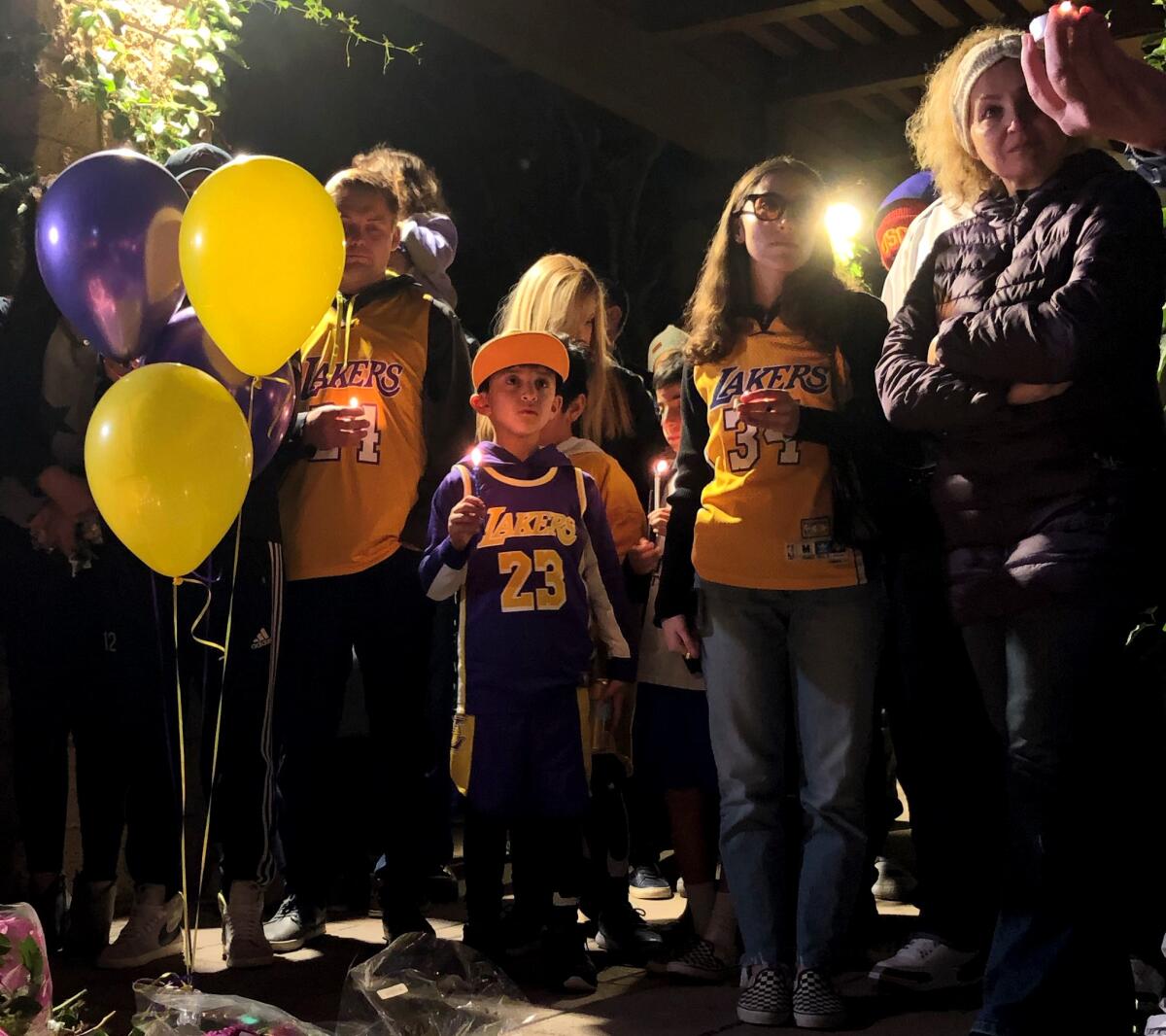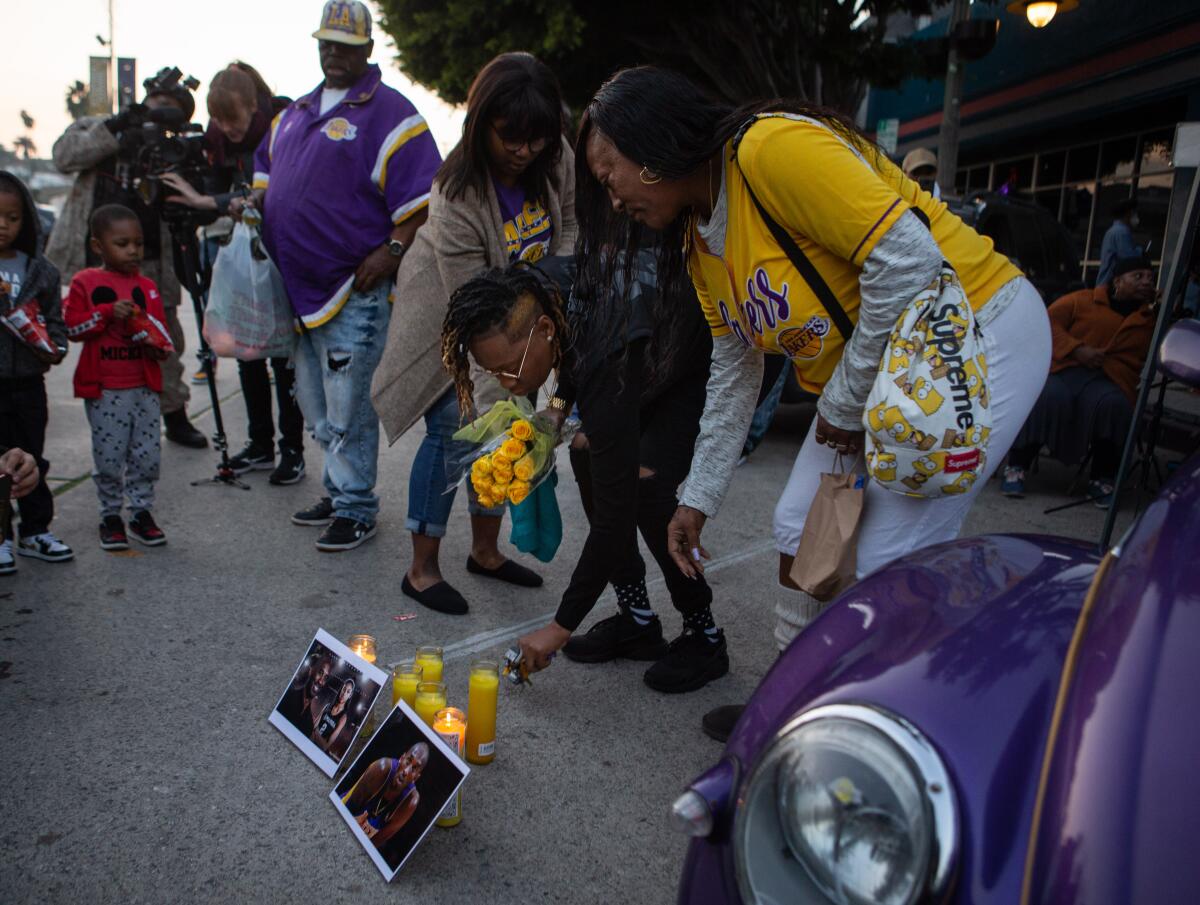Honor kidsâ feelings about deaths of Kobe Bryant and the 3 children killed in crash, psychologists say

Many children looked up to Kobe Bryant, an icon even years after his retirement from basketball.
Other kids might not know who Bryant was or even what a helicopter is, but that doesnât mean they donât know something big happened.
Young people may need help as they navigate grief over the deaths of the Lakers legend and eight others, including three children, who perished Sunday in a helicopter crash in Calabasas. Or the tragedy may remind them of the death of someone important to them. It may simply create hard questions.
Adrienne Feilden, a child life specialist at Fountain Valley Regional Hospital & Medical Center, typically helps children avoid the potential trauma of a hospital stay. But she said she has her ears open for Bryant questions.
As of Tuesday, she had already heard a couple of school-age kids bring it up while playing, which she said is a typical way for young minds to process difficult news.
She said kids will absorb whatâs around them even if they had never heard of Bryant or are too young to remember his playing days.
Parents should resist suggesting that their concerns donât matter much because they didnât know the sports hero personally, Feilden said.
âWhat youâre doing is not validating what is going on for them,â she said. âWe have to accept whatever the child is saying.â
Psychologist Jennifer Dragonette said social media and the internet make todayâs young people feel close to celebrities and other people they havenât met in person. She suggests that parents be accessible.
âIf a child knows that we can handle their negative emotions, theyâre going to come to us with them more often,â and that in itself is a positive and powerful thing, she said.
Dragonette is executive director of the Newport Academy, which treats adolescents with mental health issues, eating disorders and substance abuse.
She said parents should directly address their kidsâ concerns, listen, stay open-minded and ask what would feel right to help them along, like playing basketball. Be aware that children are not as experienced with loss and that grief can be scary and come and go, she said.
âBe willing to have conversations with them, which might seem really obvious,â Dragonette said. âSay something like, âI know you really looked up to Kobe Bryant. He died this weekend. How did that impact you?ââ
The worst thing to do would be to try to make those feelings go away, even inadvertently, she said.

The three youngest crash victims were from Newport Beach and attended area schools, which have stepped up psychologists on campus. Bryantâs 13-year-old daughter Gianna, an eighth-grader at Harbor Day School in Corona del Mar, died in the crash along with two other members of her club basketball team â Alyssa Altobelli, 14, and Payton Chester, 13.
The Newport-Mesa Unified School District mobilized specialized support teams. Harbor Day opened its doors to Giannaâs classmates the night of the crash to support one another and talk to their teachers and mental health professionals. The next morning, the school held a parent assembly to offer tips on how to talk to children about death and grieving.
Mery Taylor, a pediatric psychologist at Childrenâs Hospital of Orange County in Orange, said parents should monitor their childrenâs news and social media intake and ensure theyâre doing their usual activities and not dwelling on the tragedy. She said to reassure children, especially those prone to anxiety.
She also said to honor childrenâs connection to the deceased, ask them what they want to do and help them achieve it.
âWe feel better when we can do something,â Taylor said. âIt can be as simple as saying a prayer for the individual or family left behind.â
Dragonette said parents shouldnât be afraid to say the word âdiedâ but to keep it simple for younger children.
Feilden, who also is a nurse, suggested being honest and concrete while tailoring the level of complexity to the age of the child.
For older children, parents can direct the conversation to positive examples theyâd like to take from Bryant, she said. For a young child who might visit a memorial but not understand why itâs there, simply tell them.
âThere was a man that played basketball that a lot of people loved, and weâre here to remember him,â she said.
All the latest on Orange County from Orange County.
Get our free TimesOC newsletter.
You may occasionally receive promotional content from the Daily Pilot.





